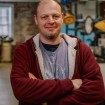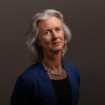People Behind Our Research: An innate curiosity inspired Darwin Conwell's medical career
When attempting to find a solution to a problem, sometimes the most effective question you can ask yourself is "why." Research requires a certain level of curiosity, one that forces you to continuously ask that question. Curiosity is what motivated Darwin Conwell to get involved with research and become a medical pancreatologist.
“I was always interested in science as a young child, always asked a lot of questions,” said Conwell, the chair of the Department of Internal Medicine for the University of Kentucky College of Medicine. “And when I got into high school, I was very interested in chemistry. I started following that path of hypothesis testing, curiosity, working in a laboratory and it was just a natural fit.”
After graduating with his medical degree at the University of Cincinnati, Conwell completed his residency at The Christ Hospital in Cincinnati, followed by a fellowship at The Cleveland Clinic Foundation and later a Master of Science at the University of Michigan. He served as a lecturer and associate professor at Brigham and Women’s Hospital in the Harvard Medical School Department of Medicine, before joining the faculty at The Ohio State University. He came to UK in April 2022.
“I think I was born to be a medical pancreatologist,” said Conwell. “My 10th grade science fair project was called the enzymatic processes of digestion. I had my dad in the garage with two Windex bottles forming and molding them into a stomach. We went to Marshall Medical School, got some digestive enzymes and digested beef roasts that my mom baked in the kitchen. Needless to say, that science fair project did pretty well.”
Conwell credits his brother Delandual Conwell, a member of the UK football team in the early 1990s, for being the reason he now resides in Lexington.
“My brother was the biggest draw for me to come to the University of Kentucky,” said Conwell. “He left high school and came here on a football scholarship and never left. You couldn’t pry him out of Lexington. It’s a great place to live. My wife and I love it here.”
Conwell is currently working with other medical and academic centers across the United States in order to learn more about chronic pancreatitis, diabetes and pancreas cancer.
“There’s an interrelationship between these diseases, and they’re really fascinating because diabetes is a major public health problem,” said Conwell. “Interestingly enough, hereditary pancreatitis was discovered here in Kentucky.”
Conwell says he’s excited about a partnership with the Research Scholars Program and the Research Priority Areas, supported by the UK Office of the Vice President for Research.
“I met with Nancy Schoenberg and Stephanie White and their Research Scholars Program,” said Conwell. “I’m so excited to partner with them and their opportunities to help our junior faculty be on a road to get NIH funding and be prepared to compete at that level. I think what Dr. Lisa Cassis, vice president for research, has done with the Research Priority Areas is amazing.”
Conwell’s research provides a link to the Diabetes & Obesity Research Priority Area, one of seven areas in this initiative that provides internal funding to bolster research infrastructure and enable experts working across centers and colleges boundaries to collaboratively tackle complex projects with direct impact on Kentuckians.
“Dr. Conwell is a proven educator, mentor and advocate for change,” said acting UK College of Medicine Dean Chipper Griffith, M.D. “He has a proven record of growing a health care workforce in an inclusive manner that enhances diversity and addresses health inequities. He will be an excellent leader as he works to support the efforts of our current faculty, staff and learners now and as the department grows.”
Even though Conwell has been in Lexington and at the University of Kentucky for just a short time, he has already begun to find himself at home.
“Here at the University of Kentucky, I’ve been really treated very well, and I see people here who treat me as a human being, as just a man. And I really have been respected and just honored to be part of this organization.”





